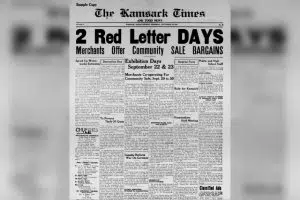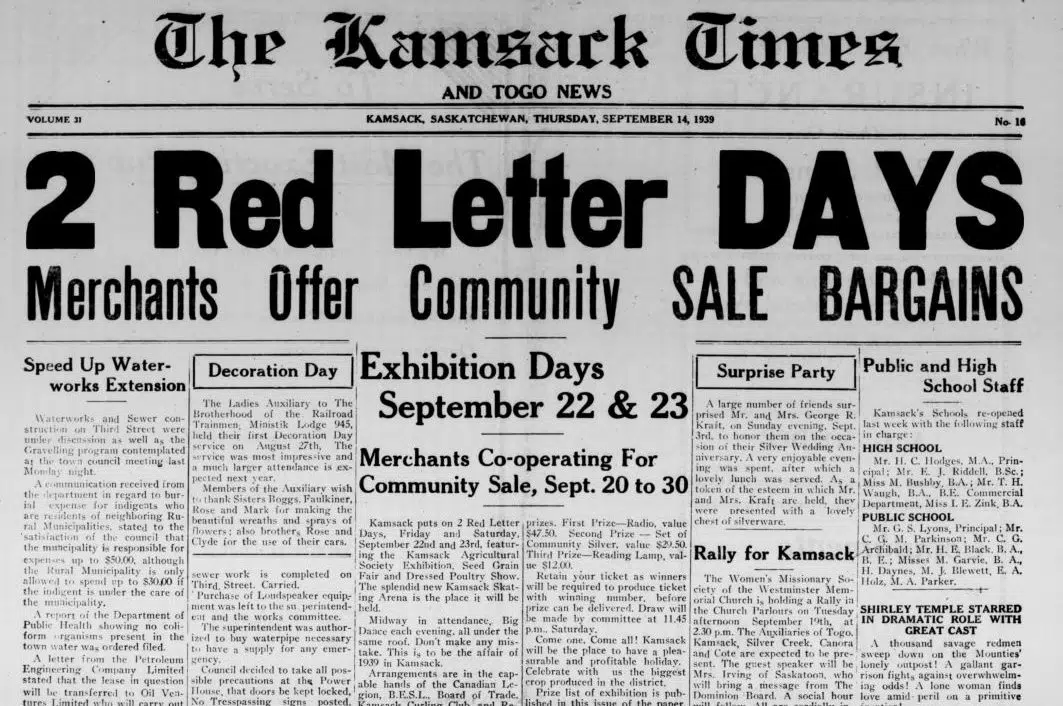Eighty years ago today, Canada declared war against Nazi Germany, joining Allied forces in battle in the Second World War.
Local, weekly newspapers from around the province provide a window to the past, revealing how people on the prairies came to terms with a second war in just 21 years. The Provincial Archives of Saskatchewan is digitizing and publishing the papers.
Canada’s entrance into the war wasn’t always declared with big, bold headlines.
“On several of the papers, you’ll see on the announcement of the declaration of war of Canada against Germany, it takes up very small space on the front page,” Curt Campbell said.
He’s the manager of records processing and preservation at the Provincial Archives.
Take the Liberty Press in Craik on Sept. 14; it has just a brief at the bottom of the front page. In the Kamsack Times, the top story is about a community sale.
It’s only further down, below where the fold would be, that one can find the headline, “Canada Declares War On Germany.” The story is only about seven column inches.
“Our group here at the archives was sort of discussing this,” Campbell said. “We were thinking it has a lot to do with people almost in denial about what’s going to be coming.”
On the other hand, The Togo and Pelly News was much more frank about the nation’s second foray into a world war.
“The struggle will be bitter and cruel and probably long. The time for discussion, for criticism, for recrimination, for thoughts of what might have been, or of how peace might have been preserved, all now belongs to the past,” the paper stated.

Canada’s war declaration on Nazi Germany appeared as a small column below the fold of the front page of the Kamsack Times on Sept. 14, 1939. (Provincial Archives of Saskatchewan)
Campbell said that’s a stark difference from how papers presented the First World War, which many believed would be short.
“You do have a lot of veterans from the First World War who realize this is not going to be a pushover; this is going to be a major, major confrontation, and it’s going to take years for it to wrap up,” he said.
The Second World War also took more than 1 million Canadians to serve, 45,000 of who were killed in action and never returned home.
Toward the end of the war, newspapers reflected the consequences.
From the Broadview Express on Oct. 12, 1944:
“It is our sad duty to record the death of another young man of the Grenfell district, who has paid the supreme sacrifice in the fight for freedom.
“Pte. Leslie Edward George Carr, son of Mr. and Mrs. Ed Carr, who died of wounds October 1st, while serving in Italy with the Canadian army …”
In the war’s early days, newspaper pages reflected how life went on, with coverage of town council, the Wheat Pool and small-town quirks.
“Cows need to be milked, people need to get married, children being brought up, things like that,” Campbell said.
From the Herbert Herald, on Sept. 14, 1939:
“The Honourable E.M. Culliton, provincial secretary and miss Katherine Mary Hector were united in marriage last Saturday morning at the Sacred Heart Church in Lebret …
“The bridal pair left for the Pacific coast for a wedding trip. They will make their home in Regina.”
Campbell described the mood: “Yes there’s this war having been declared, but at the same time, life needs to be lived and enjoyed.”











